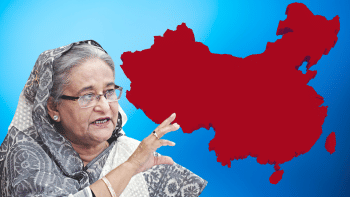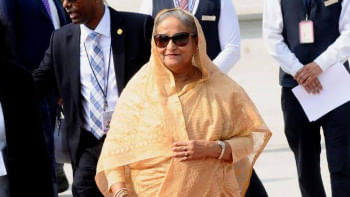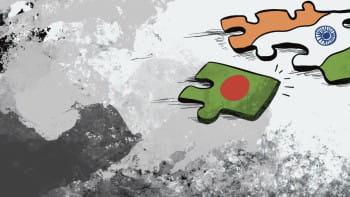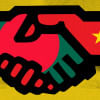How will Bangladesh-China relations shape up?

If Bangladesh is suspended within the geopolitical tripod of India, China and the United States, where are we positioning now? The current discourse suggests that priorities are set where the near-neighbour with the largest GDP on the planet only gets bronze, not silver, and certainly not gold.
Beijing keeps its customary quiet demeanour, scrupulously keeping to its decades-long policy of not publicly interfering in internal matters. They are, however, quite interested in the events of the Bengal delta. The Global Times on August 12 noted that Donald Lu's visit in May was seen by some as "part of a strategy to pressure Hasina into acting against China." Liu Zongzi, director of the Center of South Asia Studies at the Shanghai Institute for International Studies, guessed that the reason for the US "seeking to overthrow her [Hasina]" was "(her non-compliance) with the US on many issues."
Myanmar and St Martin's Island
Let's chat about St Martin's Island, a tiny, three square-kilometre coral outpost, as referred to in Chinese media. I visited the island—also known as Narikel Jinjira—in 2001, staying there for a night—a time when it was still not on the tourist trail. It took mere minutes to walk from one end to the other. Could this fragile place really be the location for a US base, to add to their 800-plus others around the globe? Eight kilometres off the coast of Arakan, some suggest it could be a listening post and a forward deployment point. In the age of drones, could one intervene in Arakan and the rest of Myanmar? It reminds us how Bangladesh and Myanmar security forces faced off each other in 2018.
Whether it is St Martin's or Teknaf is not the issue. Beijing is naturally alarmed by the civil war in Myanmar, with which it shares a long porous border. Instability in this resource-rich place directly affects Yunnan. Given that the US is confronting China in the Taiwan Straits, it is plausible that a "second front" might appear on the Irrawaddy (Ayeyarwady). If Dhaka shifts from Delhi to Washington's orbit with this new administration (or possibly a BNP one), Beijing will naturally look at the security implications across the Naf River and beyond.
In 2024, the unipolar world of yesteryear has disappeared. China is the manufacturing core of the world. It is the largest consumer market, too. It is just that we have little to sell to them, hence the urgent necessity to set up newer production lines to create higher skilled jobs.
More than a million Rohingya remain trapped in an open air confinement in Bangladesh's Cox's Bazar. Imploring China to assist with their repatriation begs the question: why are they going to spend enormous amounts of political capital in dealing with the brutal Tatmadaw or the Arakan Army? Dhaka needs to formulate a much broader policy on Myanmar, which takes into consideration Beijing's anxieties and seeks common ground between the two. That would be a first. Besides the Rohingya, how often have our political elites ever evinced an interest in Myanmar—and thus China?
There was one time. In 2012, there were talks of Chinese willingness to build a direct road from Kunming via Mandalay to Teknaf, which was shelved. India leaned on Yangon to block that lifeline. Later, Delhi also put an end to the longer route from Kunming to Kolkata, via Dhaka, which had been rebranded as BCIM (Bangladesh-China-India-Myanmar Economic Corridor).
Treating China like a cash cow?
This is where we come to the nub of the problem. We see China as just a giant foreign aid ATM. They are ready to lend and build as part of the Belt and Road Initiative (BRI), but they also seek a deeper partnership.
Even though I had my fears, I wrote a piece in this daily in July, titled "Mission to China." I was shocked how disastrous the trip to Beijing turned out to be. Last year, in discussions in Dhaka, I was led to believe that the Awami League government would shift dramatically to Beijing after securing its victory in the January 7 (s)election. But would Delhi allow such a thing? This year, Sheikh Hasina made not one, but two, visits to Delhi. The second one looked like a dressing down by the South Block. Chinese offers to invest over a billion dollars in saving the little water that came from the Teesta River were to be rejected. So were any major breakthroughs. So, the former foreign minister, Hasan Mahmud, and associates bandied about the sum of money they would ask out of China. $5 billion worth of yuan, which became $2 billion. More infrastructure—easy to syphon commissions from, perhaps.
This was capped off by a severe breach of diplomatic protocol. Hasina and her courtiers tore up the schedule and returned one night earlier. Mahmud claimed it was because she was terribly ill. Even if it was because they got wind of the seriousness of the student revolt, the then foreign minister and colleagues could have remained. But no, they returned—all smiles. Criticisms were batted away with a prime ministerial diagnosis that our heads had to be examined.
As a gift, China upgraded the relationship to that of a Comprehensive Strategic Cooperative Partnership. Has anyone noticed much of any dialogue or observations about this?
That was then, this is now
Over the last decade, we have been unable to work with China to build a new industrial export sector to wean us away from our dangerous dependency on the RMG sector. Jagaran Chakma's report in this daily last month detailed the painful odyssey of the Chinese Economic and Industrial Zone. The 784-acre site in Chattogram was allocated for Chinese industry. Intended to create as many as 200,000 jobs, it is still inoperative for eight long years.
The interim government must talk about jobs, industrialisation and the partnership with China. Last month, the issue, at its ultimate core, was not only the unfair distribution of bureaucratic posts; it was also the profound lack of decent employment in the private sector. To solve that, one needs a policy, a strategy and shedloads of capital. Right now, only China offers that quantity of capital and expertise to invest in new industries. Supply chains, component-producing factories, industrial clusters are all exporting to earn dollars and yuan. This should form the basis of the developmental discourse, and it should be steered towards modern industry and associated technology.
In 2024, the unipolar world of yesteryear has disappeared. China is the manufacturing core of the world. It is the largest consumer market, too. It is just that we have little to sell to them, hence the urgent necessity to set up newer production lines to create higher skilled jobs.
Can Md Touhid Hossain convince us that Bangladesh has not moved merely from the Indian leg of the tripod directly to a distant Western power? I would like to hear more about how Bangladesh will work with China, to genuinely further mutual interests. This is still a least developed country. Tens of millions of young Bangladeshis are rightly impatient. Time is short.
Farid Erkizia Bakht is a political analyst.
Views expressed in this article are the author's own.
Follow The Daily Star Opinion on Facebook for the latest opinions, commentaries and analyses by experts and professionals. To contribute your article or letter to The Daily Star Opinion, see our guideline for submission.

 For all latest news, follow The Daily Star's Google News channel.
For all latest news, follow The Daily Star's Google News channel. 











Comments